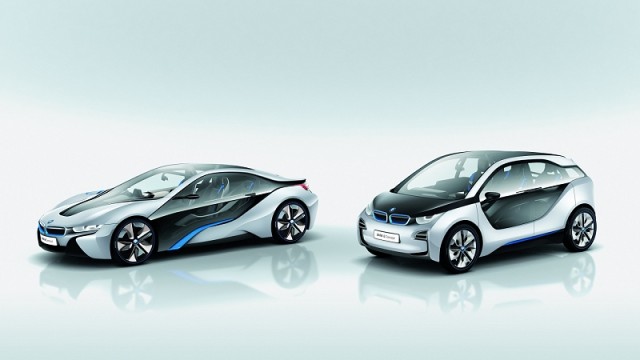BMW pulled out all the stops for the first full unveiling of its 'i' cars to the automotive media. A high-tech stage and slideshow were complemented by dancers and massive projectors, but through it all shone the stars of the moment, the new i3 and i8.
They both share advanced, mass-produced carbon fibre reinforced plastic bodies and what BMW is referring to as the LifeDrive architecture. BMW reckons this has resulted in a 250 - 350kg weight reduction, to the benefit of dynamics and efficiency.
With seating for four adults and a 200-litre boot, the i3 is a boxy five-door mini-MPV. It's what BMW was referring to as its Megacity Vehicle and large urban areas are clearly its natural habitat, as it's fully electric. The motor is mounted at the rear and sends 170hp and 250Nm of torque to the back wheels, enabling a 0-100km/h time of 'less than eight seconds'. Its range is 150 kilometres and a full charge takes six hours (though a quick charge to 80% is possible in an hour).
The i8 should look familiar, as it's very similar to the stunning Vision EfficientDynamics concept car. This is a low-slung two-plus-two sports coupé with a plug-in hybrid powertrain. At the front sits the i3's electric motor, while a turbocharged three-cylinder engine is mounted in the rear. Combined they produce 220hp and 300Nm of torque. BMW claims that the i8 will hit 100km/h from rest in less than five seconds, while using about 3.0 litres/100km (94mpg) on the combined cycle. It can drive for 35 kilometres on electric power from its lithium ion battery alone.
Both the i3 and i8 will be built a BMW's Leipzig plant in Germany, which currently makes the 1 Series, 3 Series and X1. It will require significant upgrading to produce the carbon fibre bodies and a wind power plant is also planned in a bid to reduce the overall carbon 'cost' of producing the i cars. They will also feature extensive use of renewable and recycled materials.
BMW plans to distribute the i cars a little differently too, focusing on urban areas, rental and leasing schemes and mobile sales teams, in conjunction with a lot of online marketing and sales. Nobody wanted to discuss the possibility of other i models, but the naming strategy obviously leaves room for plenty of other body styles. While BMW has invested heavily in this project, the i cars' mechanicals were developed in conjunction with PSA Peugeot Citroen, so expect to see more electric vehicles from them in the near future.
Although the show cars are billed as concepts, we're informed that the production versions, due on sale in 2013, will not be all that different. BMW's personnel were unsurprisingly cagey about pricing, but estimates of €50,000 for the i3 and €180,000 for the i8 seem reasonable.

